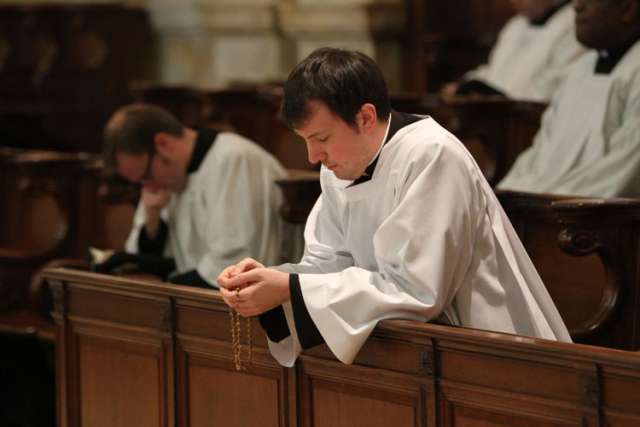The 12th-century Persian poet Rumi submits that we live with a deep secret that sometimes we know, and then not.
The divine will always involved pain, struggle
By Fr. Scott Lewis, S.JThird Sunday of Easter (Year A) May 4 (Acts 2:14, 22b-28; Psalm 16; 1 Peter 1:17-21; Luke 24:13-35)
There are two streams of history active in our world and they often work at cross-purposes. The first stream consists of human schemes and behaviour that are often the expression of desires, fears, jealousy and hatred. Even our best intentions are often fatally compromised by the presence of these tendencies. The world as we experience it is the unhappy result. The other stream is that of God’s will operating in history. It is relentless; even when temporarily diverted or blocked by human behaviour, it always triumphs in the end. God’s will is the redemption of all humanity and the transformation of the world.
We need to share our riches with the poor
By Fr. Ron RolheiserWe need to give away some of our own possessions in order to be healthy. Wealth that is hoarded always corrupts those who possess it. Any gift that is not shared turns sour.
Resurrection reveals God as redeemer, not rescuer
By Fr. Ron RolheiserBefore you get serious about Jesus, first consider how good you are going to look on wood!
No substitutes for the Lord
By Fr. Scott Lewis, S.JSecond Sunday of Easter (Year A) April 27 (Acts 2:42-47; Psalm 118; 1 Peter 1:3-9; John 20:19-31)
The Church had very simple beginnings. There were no impressive church buildings or elaborate liturgies. In those first generations of the faith, believers met together in their homes. Their new faith was not just a religion but a new way of life lived together and in common. The presence of the Spirit and their shared, unified life were the source of energy and power. There was no “mine and thine” attitude, for they shared all that they had, ensuring that no one was deprived of the basics of life. Their shared ideals and union of minds and hearts bound them together in what they called the body of Christ. This resulted in a community in which the trust and support level was very high. But far more powerful was the observation that they ate their shared meals with “glad and generous hearts.”
Selfless love takes us on God’s path
By Fr. Scott Lewis, S.JResurrection of the Lord (Year A) April 20 (Acts 10:34a, 37-43; Psalm 118; Colossians 3:1-4; John 20:1-18)
Christians do not often sound joyful and excited when describing the wonderful deeds of Jesus. Perhaps more disturbing is the fact that many would be hard pressed to describe the activity of Jesus in today’s world or in their own lives.
What dark nights do for us
By Fr. Ron RolheiserAfter Mother Teresa died, her diaries revealed something that shocked many people. During the last 60 years of her life she struggled to imagine that God existed and had no affective experience of either the person or the existence of God. Yet, during all those years, everything in her life incarnated and radiated an exceptional, one-in-a-hundred-million selflessness, altruism and faith commitment.
Windsorite taught us how to live the Bible
By Fr. Thomas Rosica, CSBWith the sudden death of my Basilian confrère Fr. Ulysse (Bud) Paré on March 25, many tributes and accolades will rightly be heaped upon him for his academic accomplishments, first at the University of Toronto, then at Rome’s Pontifical Biblical Institute and at the University of Fribourg in Switzerland. His many former students at St. Thomas More College in Saskatoon, the University of Toronto, Assumption University in Windsor and most recently at St. Peter’s Seminary in London will fondly recall his clear, dynamic presentations on exegetical methods and hermeneutical interpretation of the Bible.
Striking gold with a Lenten prayer vigil
By Mary MarroccoDid I really want to spend a long evening sitting alone in a chapel — not getting done any of the things I wanted to get done, not visiting any of the people I wanted to visit, not having any of the adventures I wanted on a Friday night? Instead, a seven to midnight Lenten prayer vigil.
Our deeper way of praying
By Fr. Ron RolheiserWhen we no longer know how to pray, the Spirit, in groans too deep for words, prays through us.
Jesus died in agony trusting absolutely in the Father
By Fr. Scott Lewis, S.JPassion Sunday (Year A) April 13 (Isaiah 50:4-7; Psalm 22; Philippians 2:6-11; Matthew 26:14-27:66)
There is a great difference between passivity and non-violence. People often confuse the two, but the first is something to overcome while the latter is a powerful spiritual principle.











